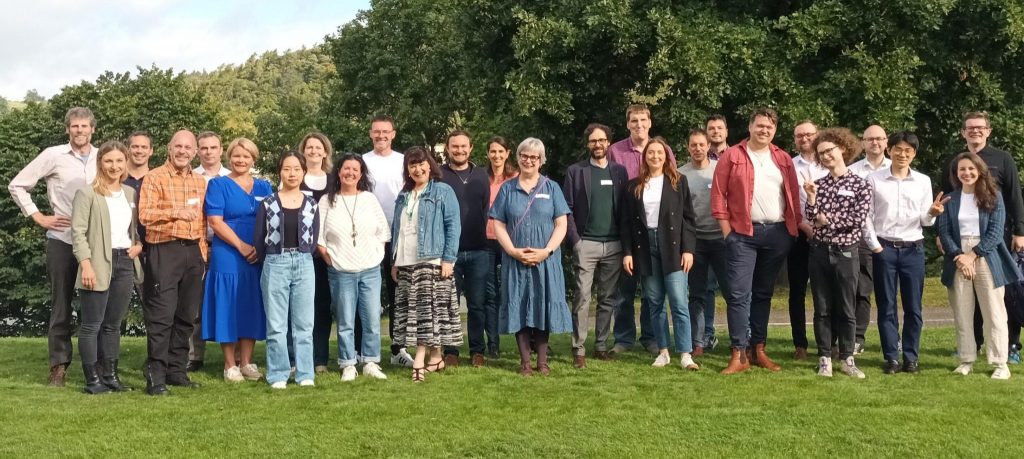Welcome!
We at the Stirling Behavioural Science Centre are proud to offer the MSc in Behavioural Science. It is one of the longest-running Masters courses in Behavioural Science worldwide, and the first cohort started over a decade ago in 2013.

Alumni and faculty past and present at our ten-year reunion, September 2023
What this MSc is about
The MSc will teach you how to use behavioural insights to better understand and change behaviour. You will learn about the most robust behavioural insights as well as the cutting edge of the newest discussions in the field and state-of-the-art methodological approaches. You can apply this knowledge in either the private or the public sector. You will benefit from the MSc if you have recently finished your undergraduate degree and also if you have years of experience already.
Jobs and opportunities
Through our network, we have developed links with various organizations who offer opportunities directly to our students. Cowry Consulting, a leading behavioural consultancy, holds a place on their summer program for one student from our program each year. They also send their behavioural architect, Sam Shand MSc, to teach on the program 4 times over the academic year.
More generally, the opportunities for graduates with behavioural science expertise are better than ever. More and more companies and public institutions require the skills to understand and change behaviour in effective and ethical ways. Behavioural insights are increasingly used by large and small businesses as well as governments all over the world. The OECD has compiled data from over 300 institutions applying behavioural science to public policy (link).
Graduates of our programme have found jobs at “nudge units” such as the UK Behavioural Insights Team, national governments, regulatory bodies, large corporations, charities, and consultancy firms. Other graduates have started their own businesses and others have gone on to PhDs. This MSc qualifies you for jobs in behavioural insights teams, people analytics teams, marketing and market research, data science teams, public opinion research, human resources, change management, and also in leadership roles in the private and the public sector.
A great student experience
Graduates of our programme also had a fantastic time studying behavioural science with us. The MSc earned 100% student satisfaction in the Postgraduate Taught Experience Survey surveys in 2020, 2021, and 2022.
Embedded in the Stirling Behavioural Science Centre
The MSc is hosted by the Stirling Behavioural Science Centre, and you will have the opportunity to interact with leading practitioners and researchers from Stirling and beyond. We have a great network which will provide you with opportunities to design meaningful behavioural interventions with real-world relevance.
The Modules
We designed seven complementary modules for this programme. Within most module you will have opportunities to work on topics you are most interested in and specialize if you like to.
1. Behavioural Economics I: Concepts and Theories (Autumn). You’ll learn the basics. Key questions include: How do economics and psychology complement each other? What is optimal behaviour and how do people actually behave? What is System 1 and System 2 thinking? How do risk, time, and the social context influence behaviour? How do emotions and how we see ourselves influence what we do?
2. Psychology of Work (Autumn): You’ll apply psychological theories to better understand people’s behaviour in the work context. A focus will be on personality traits and individual differences. Key questions include: How to avoid biased recruiting? How to improve job search? What motivates people to work? When are people happy at work? What is the role of sustainable work practices? How to lead?
3. Statistics with R (Autumn): Every good behavioural scientists knows their stats. You’ll learn the fundamentals using one of the best (and free) programming languages being actively involved in a research project. You will learn key skills such as running, interpreting, and reporting statistical analysis; understanding data collection; and applying a range of statistical methods such as regression and ANOVA.
4. Behavioural Economics II: Business & Policy Applications (Spring): You’ll learn to apply behavioural insights to change behaviour using nudges, boosts, and behaviourally-informed regulation. Key questions include: How to develop behavioural interventions? How to design behavioural interventions ethically? You will learn about taxonomies, tool-kits, and frameworks that will help you develop a behavioural intervention proposal in an area of your choice.
5. Evidence-Based Decision Making (Spring): Good behavioural scientists know how to test whether a behavioural theory is correct or whether a behavioural policy intervention is effective. This module will teach you to design experiments to test behavioural theories and interventions in relevant areas. The module will also teach you to use existing data to make better evidence-based decisions. You will become familiar with concepts such as statistical inference and causality.
6. Survey Measurement & Analysis (Spring): Survey design is a key skill of every behavioural scientist needed to test theories and interventions. You will how to design social and behavioural surveys and analyse the data they produce. You will also learn about subjective and psychometric scales and behavioural and biological measures in behavioural science research.
7. Dissertation: Here you showcase what you have learned. Supported by a supervisor from the Behavioural Science Centre, you will carry out a research project in an area of behavioural science which interests you. You will design and execute a research project from start to finish and contribute to knowledge in an area that is important to you.
Teaching staff
Teaching staff includes:
- Dave Comerford
- Seda Erdem
- Leonhard Lades
- Mirko Moro
- Till Stowasser
- Craig Andersen
- other members of the Behavioural Science Centre and external expert guest lecturers.
Contact Information and Application Procedures
If you are considering applying then please email Program Director Professor Dave Comerford:
david.comerford@stir.ac.uk
The application process, along with further information including testimonials from former students, is here:
MSc Behavioural Science | Find a course | University of Stirling